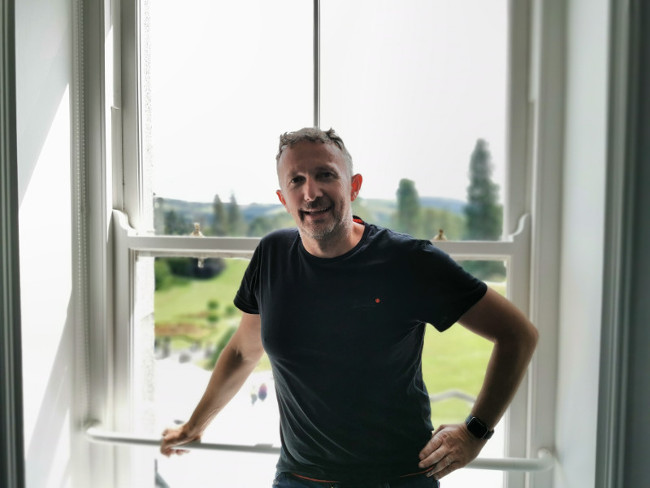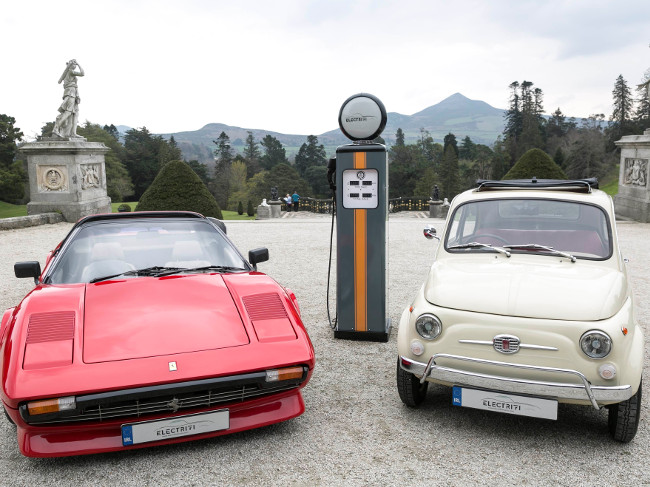From saving businesses potentially billions to making sustainability cool, Norman Crowley tells John Kennedy how he is just revving up.
As I walk across the sprawling Powerscourt Estate I get a sense of déjà vu. I had been here before at least 20 years ago to meet Salesforce when it first opened its offices in Ireland and lo’ and behold I find Norman Crowley ensconced in the exact same offices at the top floor of Powerscourt House with breadth-taking views of the estate’s gardens and the nearby Wicklow mountains. Downstairs, as tourists meander and weave through the grounds is a Cool Planet Experience devised by Crowley Carbon to help people understand how they can make sustainability a reality by living differently.
Crowley – a successful businessman who started and sold three businesses for more than $750m before he was 40 – reappeared on my radar when it emerged he planned to create 150 new jobs as part of a €50m investment in his latest venture Electrifi, the first company to manufacture cars in Ireland since Ford closed its manufacturing plant in Cork 40 years ago. At first the company will focus on converting classic cars like Ferraris, Fords and Jaguars from petrol-guzzlers into clean energy electric vehicles. Then it will build its own-brand cars.
“We have a vision for Crowley Carbon to save $1bn a year in energy, which we are well on the way to”
Electrifi is just one facet of his Crowley Carbon group of companies that include various interests from solar energy to venture capital and corporate social responsibility, all with one aim to inform and take practical steps to save Earth from the ravages of climate change.
Crowley’s enterprising spirit can be traced back to his childhood in Ballinascarthy, Co Cork, where he remembers his father getting him and his siblings to sell raffle tickets to raise cash to build the silver Model T Ford monument that sits alongside the main road through the village to honour it as the birthplace of Henry Ford’s father, William.
The game of business and life
A consummate entrepreneur, Crowley ran various enterprises from panel-beating to limousine rental before starting digital agency Ebeon in the 1990s. Ebeon was just one of a number of companies acquired by Eircom (now Eir) as it bulked up for its IPO in 1999. As the dust settled on the doomed IPO and as a tech downturn began to bite, Ebeon along with other Eircom-owned firms such as Nua were shut down.
“We are capitalists with a conscience or practical socialists. The problem can be fixed, the solutions can be much cooler than the alternative”
Recalling the tumultuous time, Crowley said he was fielding calls from journalists just as his wife was about to give birth to their second child. “I joked with a journalist once that on my headstone will be chiselled ‘it was profitable when I sold it.’ But because Ireland wasn’t used to failure, I think we got hit pretty hard, actually.
“But that’s all part of courage. We are brave. You get back up on the horse and go again. This happens in business. These waves happen of either positive or s*** basically, and hardly a year goes by where you are not firefighting. People think that as you get bigger you are more removed from the firefighting, but actually just as the numbers get bigger so too do the risks.”
What few people know about Crowley is that just days after Ebeon closed, he re-assembled core members of his team – chiefly because he liked working with them – and decided to do something, anything. “I didn’t want to lose these people, so I set up the business without a plan. I was in the UK visiting a friend who worked at William Hill and was waiting for him in a betting shop and noticed the slot machines that looked like something from the 1970s. He told me that they in fact represented 80pc of the profits of the shop came from those machines. I said why don’t they make digital machines but he told me anyone who tried before failed.”
He explained that at the time a slot machine in a bookies would earn £100 a week. So we invented a broadband-connected machines but it only took in £60. “Our version 2, however, started to take in £700 a week because it was more reliable and had better games. In no time William Hill asked us to roll out 7,000 machines ‘as fast as you can possibly get them’.”
The slot machine business– entitled Inspired Gaming Group – grew in just five years between 2001 and 2006 from eight people to 2,500 employees and from zero revenue to £400m. In 2008 the company floated on the London Stock Exchange.
Illustrative of the vagaries of fortune in the business world, Crowley and his co-founders were on the verge of selling the company for $1bn to an Icelandic hedge fund in 2007 when it was scuppered by the first signs of gigantic financial crash that was to follow in 2008. Crowley and his team regrouped and eventually sold Inspired Gaming Group for $500m in late 2008 to a private equity fund.
He is stoic about the ups and downs. “We were just waiting on a phone call to sign on the dotted line to sell the company for $1bn and then the whole world began to implode. Timing is everything and you need a certain amount of luck. But if you work just as hard as we work you will get lucky and you will do really well. But sometimes you can be extra lucky and extra unlucky, and that happens every day of the week.”
A sustainable planet
Sticking true to his getting back on the horse ethos, within a week of selling Inspired Gaming Group Crowley founded Crowley Carbon to address his concerns about global warming and to build a sustainable group of companies while doing so.
“In terms of Electrifi, we are different to Tesla because their vision is everyone should have a Tesla. They love what we do, but think we are nuts. We just want to build the world’s most beautiful cars”
“It’s about the work. It comes from my dad, actually. My dad passed away two months before his 90th birthday and he was working up to four weeks before he stopped. It’s in us Crowleys, it’s about the work. People say of us ‘those guys work’. It’s about the work. When it comes to Crowley Carbon, it is about the work but it is also about purpose.”
Crowley describes Crowley Carbon as an energy efficiency business that helps corporates such as Musgraves, an early client, figure out how they can save hundreds of millions, if not billions, on their energy by optimising use of solar and wind sources and installing new technologies for better efficiency. “We just finished a project in Abu Dhabi for a big food company and we were in and out in just three weeks and we saved them 60-megawatts per hour by just optimising their cooling system.
“Industry wastes 40pc of all the energy it consumes every year. So every week that goes by we are helping save the equivalent of a powerplant the size of Ringsend by fine-tuning things like boilers, cooling systems, energy resources.”
Part of the business model involves assuming the risk and guaranteeing savings and generating income from recurring revenues.
Crowley hasn’t ruled out bringing the business to the public markets but for now he is focused on growing the company. “It’s really about the mission and that mission is climate change.
“Winston Churchill famously said ‘I’m an optimist because there doesn’t seem to be any point in being anything else.’ I am an optimist and we have a very large problem. Let’s solve it.”
Crowley isn’t impressed by the extremes of the argument posed by either climate change deniers or big oil companies or at the other extreme green socialists, all of whom he believes cancel each other out and serve the same purpose of misinforming or even boring the public about dealing with a genuinely urgent problem. “People don’t realise that these are two sides of the same coin. And they are driving the planet to a very warm end.
“The green socialist agenda sells it as a lack of progress agenda and something that your average, middle class consumer doesn’t want. What consumers want is good food, a warm house, holidays, their children to be safe. They don’t want to turn off the thermostat and go vegetarian immediately. And at the same time, you have the $300bn oil industry very cleverly making sure we have doubts about climate change.
“Up until recently, therefore, there has been a lack of real technological progress.”
Capitalism with a conscience
Instead, Crowley believes the answer lies in getting both businesses and consumers to act sustainably. “You have Trump on one side and crazy greens on the other side, and the problem was that there was no rational voice in the middle. We are capitalists with a conscience or practical socialists. The problem can be fixed, the solutions can be much cooler than the alternative.”
“Maybe saving the equivalent of a powerplant a week may not be sexy because boilers or chillers are not exciting, but you will remember a Lamborghini with an electric engine. So, the next time that someone says that sustainability is deeply unsexy, you can say ‘well, not the car I saw last week’”
This brings us to Electrifi, the new electric car business bringing car manufacturing back to Ireland and Wales. Crucially, Crowley wants to make electric car ownership more enjoyable. “If you held up an electric car against the sexiest petrol car in the world, like a very fast Ferrari, you will set in an Electrifi and be happy. We are working on a DeLorean at the moment and we are also working on a Ford GT40. When we started on it, it was a 400-brake horsepower car. With an electric Tesla or Nissan engine in it, it will be 1,200-brake horsepower.
“In terms of Electrifi, we are different to Tesla because their vision is everyone should have a Tesla. They love what we do, but think we are nuts. We just want to build the world’s most beautiful cars. We have our own designs for cars eventually, but remember the lowest carbon footprint Ferrari in the world today sits in our Welsh factory, end of story. That’s because we took an existing Ferrari and made it electric rather than build it new and from scratch.”
Overall, Electrifi and Cool Planet Experience fit into a portfolio of companies that also include venture capital and financing in the form of Cool Planet Capital, an internet of things company called Clarity and an insurance company called Carbon Re which is backed by Zurich.
“Let’s go back to how factories are wasting 40pc of their energy. Either you pay up and we’ll save you 40pc of your energy or you give us 20pc of your energy and we’ll give you the other 20pc back and you don’t have to put up any money. And because doing that requires a new boiler or a new chiller, we will upgrade your factory as well.
“We wanted to shock the system by showing what is possible. It is about proving the point in a radical way that positive action can be taken on climate change in a way that people remember it. Maybe saving the equivalent of a powerplant a week may not do it because boilers or chillers are not exciting, but you will remember a Lamborghini with an electric engine. So, the next time that someone says that sustainability is deeply unsexy, you can say ‘well, not the car I saw last week.’
“All of the companies in the group are pillars proving a point in a tangible way. We don’t knock government, but we will bypass councils by working with private land or business owners to install 50 water fountains outside local Supervalu stores.”
Crowley said that the approach by Crowley Carbon and its customers is very much in step with the groundswell of youth indignation as voiced by teenager Greta Thurnberg at the damage done to the planet. “Greta represents a shift, but this represents a shift too.
“It’s about whatever it takes. We’ve spoken to the board of the biggest oil company in Europe and they don’t feel too good about the world. We are speaking with one of the world’s largest oil companies about building the world’s biggest solar installation. You have to be able to work with the oil companies because they have the money and money is what is needed to mobilise action. So, whatever it takes.”
When he has time, Crowley offers masterclasses on entrepreneurship and draws upon his own experiences of walking on hot coals to describe the stresses of decision-making. “As you start to walk, be very clear about the destination because if you stop half-way or turn it’s too late. It’s the same when it comes to our vision about addressing climate change. Keep f****** waking. Because if we stop, we will burn. The stress is before a decision is made. In firewalking, you are fearful just before you take the first step, then it is gone. Because you’ve made the decision. The stress is gone.”
Now 49, Crowley concludes that the key is to keep moving.
“We have a vision for Crowley Carbon to save $1bn a year in energy, which we are well on the way to.”
Pictured (above): Norman Crowley, CEO of Crowley Capital. Image: Paul Sherwood.
Written by John Kennedy (john.kennedy3@boi.com)
Published: 16 August, 2019








